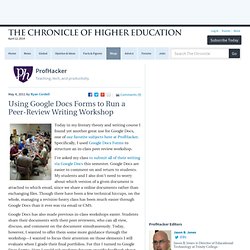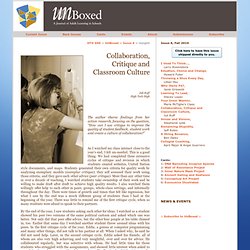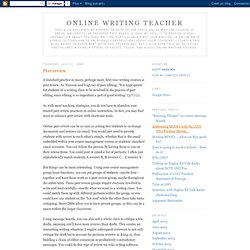

Using Google Docs Forms to Run a Peer-Review Writing Workshop. Today in my literary theory and writing course I found yet another great use for Google Docs, one of our favorite subjects here at ProfHacker.

Specifically, I used Google Docs Forms to structure an in-class peer review workshop. I’ve asked my class to submit all of their writing via Google Docs this semester. Google Docs are easier to comment on and return to students. My students and I also don’t need to worry about which version of a given document is attached to which email, since we share a online documents rather than exchanging files. Though there have been a few technical hiccups, on the whole, managing a revision-heavy class has been much easier through Google Docs than it ever was via email or CMS. Google Docs has also made previous in-class workshops easier. What were the advantages to asking students to use Google Docs Forms, rather than printing out workshop sheets? Overall, I thought it was an interesting twist on the standard peer review workshop.
How about you? 'Speed Dating' Peer-Review Writing Workshops. MIT TechTV – No One Writes Alone: Peer Review in the Classroom, A Guide For Students. Use Google Docs to Facilitate a Digital Writer's Workshop. UnBoxed: online. The author shares findings from her action research, focusing on the question, “How can I use critique to improve the quality of student feedback, student work and create a culture of collaboration?”

As I watched my class interact close to the year’s end, I felt un-needed. This is a good thing. We had completed three extensive cycles of critique and revision in which students created websites, United Nation style documents, and maps. Students generated their own criteria for quality work by analyzing exemplary models (exemplar critique); they self assessed their work using those criteria; and they gave each other advice (peer critique).
More than any other time in over a decade of teaching, I watched students take ownership of their work and be willing to make draft after draft to achieve high quality results. By the end of the year, I saw students asking each other for ideas. Critique as a matter of culture, not simply an activity Lastly, students must learn to see mistakes as natural. July 2008. A standard practice in many, perhaps most, first-year writing courses is peer review.

As Hanson and Vogt say of peer editing, “It is appropriate for students in a writing class to be involved in the process of peer editing since editing is so important a part of good writing” (577) (1). As with most teaching strategies, you do not have to abandon your trusted peer review practices in online instruction. In fact, you may find ways to enhance peer review with electronic tools. Online peer review can be as easy as asking two students to exchange documents and reviews via email.
You would just need to provide students with access to each other's emails, whether that is the email embedded within your course management system or students' standard email accounts. But things can be more interesting. Using message boards, you can also ask a whole class to critique a few drafts, meaning you'll have more reviews than drafts. Software tools can help you as well. Provide crystal clear instructions.